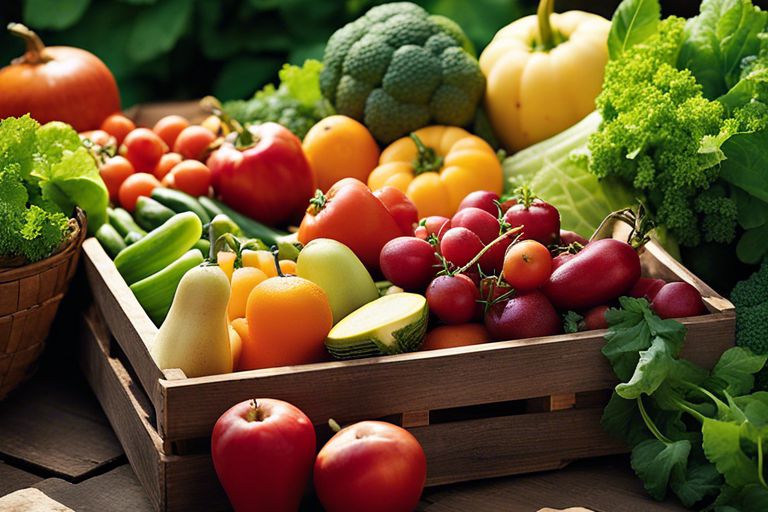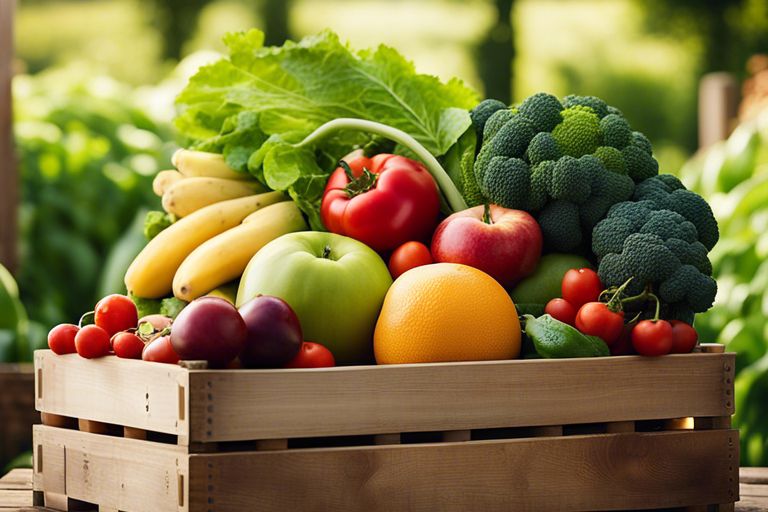Most people are becoming increasingly concerned about the food they consume and the impact it has on their health and the environment. Organic food has been gaining popularity in recent years due to its perceived health benefits and environmentally friendly practices. This blog post will explore the benefits of choosing organic food over conventional options, including improved nutrition, reduced exposure to harmful chemicals, and support for sustainable agricultural practices. Join us as we probe into the reasons why you might be missing out on the advantages of organic food and how you can make more informed choices for your well-being and the planet.
Key Takeaways:
- Organic food offers higher nutritional value: Organic fruits, vegetables, and grains are shown to have higher levels of vitamins, minerals, and antioxidants compared to conventionally grown produce.
- Reduced exposure to harmful chemicals: Choosing organic can significantly lower your exposure to pesticides, antibiotics, and synthetic hormones commonly found in non-organic foods, thereby reducing health risks.
- Supports sustainable farming practices: By purchasing organic food, you are supporting environmentally friendly farming methods that prioritize soil health, biodiversity, and sustainable agriculture practices.

Understanding Organic Certification
You may have seen the term “organic” on food labels and wondered what it truly means. Understanding the organic certification process is key to recognizing the benefits of organic food. Organic certification is a verification process that ensures food products have been grown and processed according to strict guidelines set by a certifying body.
The Organic Certification Process
The organic certification process is thorough and requires farmers and food producers to follow specific regulations regarding the use of pesticides, fertilizers, and other inputs. Farmers must also maintain detailed records of their farming practices to demonstrate compliance with organic standards. Once all requirements are met, a third-party certifying agency conducts an inspection to verify that the farm or facility meets the necessary criteria to be certified as organic.
For consumers, choosing organic products means supporting environmentally friendly practices that avoid synthetic chemicals and genetically modified organisms. Organic farming promotes biodiversity, soil health, and sustainable agriculture practices. By understanding the organic certification process, you can make more informed decisions about the food you eat and the impact it has on your health and the environment.
Health Benefits of Organic Food
Some people choose to incorporate organic food into their diet due to the various health benefits it offers. Whether it’s the nutritional enhancements in organic produce or the reduced exposure to pesticides and chemicals, there are several reasons why organic food can be a healthier choice.
Nutritional Enhancements in Organic Produce
Organic fruits and vegetables are known to have higher levels of certain nutrients like antioxidants, vitamins, and minerals compared to conventionally grown produce. This is because organic farming practices focus on maintaining the health of the soil, which in turn leads to more nutrient-rich crops.
Studies have shown that organic foods may also have higher levels of beneficial compounds such as phytochemicals, which play a role in preventing diseases and promoting overall health. By choosing organic produce, you may be providing your body with a greater variety of nutrients to support your well-being.
Reduced Exposure to Pesticides and Chemicals
Food grown using organic methods is produced without the use of synthetic pesticides, herbicides, and fertilizers. This means that when you consume organic food, you are significantly reducing your exposure to harmful chemicals that can have detrimental effects on your health.
With organic food, you can have peace of mind knowing that your fruits, vegetables, and other products are free from potentially harmful residues. By opting for organic options, you are making a conscious effort to minimize your intake of chemicals that have been linked to various health issues.
Environmental Advantages
Once again, the environmental benefits of organic food cannot be emphasized enough. Choosing organic options can have a positive impact on the environment in various ways, ranging from promoting biodiversity to conserving soil health.
Biodiversity and Soil Conservation
For starters, organic farming practices prioritize the use of natural fertilizers and pesticides, which helps maintain the delicate balance of ecosystems. By avoiding the use of harmful chemicals, organic farmers create a healthier environment for a variety of wildlife, from insects to birds. Additionally, organic agriculture practices such as crop rotation and intercropping help prevent soil erosion and promote soil fertility, leading to better long-term sustainability of the land.
Furthermore, by steering clear of synthetic chemicals, organic farming encourages the growth of beneficial microorganisms in the soil. This microbial diversity not only enhances soil structure and nutrient cycling but also plays a crucial role in carbon sequestration, thus helping combat climate change.
Impact on Water Quality and Climate Change
One significant environmental advantage of organic farming is its positive impact on water quality and climate change. Organic farming practices reduce the risk of chemical runoff into water bodies, which can be detrimental to aquatic ecosystems and human health. Additionally, organic agriculture typically requires less energy input and produces lower carbon emissions compared to conventional farming methods.
Water quality is crucial for both human consumption and ecosystem health. Organic farming practices, by focusing on soil health and biodiversity, help reduce water pollution from pesticide and fertilizer runoff. Moreover, organic agriculture’s emphasis on carbon sequestration through healthy soil management can contribute to mitigating climate change effects by reducing greenhouse gas emissions.
Economic and Social Considerations
Cost Comparison: Organic vs. Conventional Foods
Despite the commonly held belief that organic food is more expensive than conventional alternatives, an in-depth cost comparison reveals that the price difference is not as significant as one might think. When considering the long-term health benefits and environmental impact, the value of organic food becomes more apparent.
| Organic Foods | Conventional Foods |
| May be slightly more expensive upfront | Initially cheaper, but hidden costs in terms of health and environmental impact |
| Supports sustainable farming practices | Uses synthetic chemicals and pesticides harmful to health and environment |
For those on a budget, it’s important to prioritize certain organic items that are more heavily contaminated with pesticides, such as berries, leafy greens, and apples. By making informed choices and perhaps cutting back on other non-important expenses, the cost of going organic can be more manageable than expected.
The Role of Organic Food in Community and Farmer Well-Being
With the rise of organic farming practices, communities are experiencing a positive shift in their overall well-being. By supporting local organic farmers, consumers are investing in sustainable agriculture and the livelihood of small-scale producers. This not only strengthens the local economy but also fosters a sense of community and connection to where one’s food comes from.
Conventional farming methods often rely heavily on monoculture and chemical inputs, which can deplete soil fertility and harm local ecosystems. In contrast, organic farming promotes biodiversity, soil health, and water conservation. By choosing organic, consumers are contributing to a more sustainable future for both their communities and the farmers who work the land.
Conventional farming practices can lead to issues such as farmer debt, health problems due to pesticide exposure, and a loss of connection to the land. In contrast, organic farming prioritizes farmer well-being by providing a safer working environment, promoting sustainable practices, and fostering a greater sense of pride and stewardship among farmers. By supporting organic agriculture, consumers are not just investing in their own health but also in the well-being of those who grow the food we eat.
How to Integrate Organic Food into Your Diet
Not only is organic food better for your health and the environment, but it can also be a delicious addition to your diet. Whether you are new to organic eating or looking to incorporate more organic produce and products into your meals, there are several ways to make the transition easier.
Shopping for Organic Food on a Budget
An important aspect of integrating organic food into your diet is being mindful of your budget. While organic products can sometimes be more expensive than conventional options, there are ways to shop for organic food while staying within your budget. Look for local markets, co-ops, and online retailers that offer discounts on organic produce and products. Additionally, consider buying in bulk or choosing in-season organic fruits and vegetables to save money.
Identifying True Organic Products in the Market
Shopping for organic food can sometimes be confusing, as not all products labeled as ‘organic’ may truly meet the standards. To ensure you are purchasing authentic organic products, look for certifications such as the USDA Organic seal or certifications from reputable organizations. Reading labels carefully and doing some research on the brands you trust can help you distinguish between genuine organic products and those that may be misleadingly labeled.
Food labels can often be misleading, so it’s crucial to know what to look for when shopping for organic products. Organic foods should be free of synthetic pesticides, genetically modified organisms (GMOs), and artificial additives. When in doubt, choose products with minimal ingredients and recognizable, whole foods to ensure you are getting the true benefits of organic food.
Final Words
Considering all points discussed, it’s clear that organic food offers numerous benefits such as improved health, environmental conservation, and support for local farmers. By opting for organic products, you not only reduce your exposure to harmful chemicals but also contribute to a more sustainable food system. While the initial cost may be higher, the long-term advantages of organic food make it a worthwhile investment in your health and the well-being of the planet. So, next time you’re at the grocery store, consider choosing organic and experience the difference it can make for you and the world around you.
FAQ
Q: What are the benefits of organic food?
A: Organic food offers higher nutritional value, as it is grown without synthetic pesticides, fertilizers, or genetic modification. It also promotes environmental sustainability by reducing pollution and conserving water and soil quality.
Q: Is organic food more expensive than conventional food?
A: Yes, organic food generally comes with a higher price tag due to the labor-intensive practices required for organic farming and certification costs. However, the long-term health benefits and environmental impact may outweigh the cost difference.
Q: Are organic foods free from pesticides?
A: While organic farming prohibits the use of synthetic pesticides, organic foods may still contain naturally occurring pesticides. However, the levels are significantly lower compared to conventionally grown produce, making organic food a safer choice for consumers.

